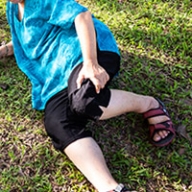What To Do for a Hip Fracture
Medically reviewed by
Eric Heimberger, MD
McLeod Orthopaedics Seacoast
Put your hand on your hip. The palm of your hand is probably on the pelvis portion of the hip joint where there’s a “socket” (acetabulum). Your fingertips touch the femur, the upper bone in your leg, which has a ball on the end that fits into the pelvic socket. A fall or sudden, heavy impact can trigger a hip fracture. In older people who have some bone loss (osteoporosis), the chances of a fall or fracture increase significantly.
“When we say ‘hip fracture,’ we’re talking about a break in the femur,” says McLeod Orthopedic Specialist Eric Heimberger, MD. “A femur generally breaks in one of three places. (See image) One, on the neck of the femur just below the ball. Two, in the large section of bone (trochanter). And three, in the straight section of the femur below the trochanter.”

SYMPTOMS
You’ll probably know it immediately if you fracture your hip. Specific symptoms to look for include pain over the upper thigh or in the groin. An attempt to move the joint results in serious distress and pain.
TREATMENT
You can expect surgery with any of the 3 types of hip fractures.
1. Minor surgery with pins and screws may repair a break near the ball. If the injury pushes the bones out of place, so they are not lined up, a total hip replacement may be required.
2. A break in the trochanter will likely require traction (with weights and pulleys) and surgery with pins and screws to stabilize the break.
3. A long metal rod may be placed in the femur to line up the broken parts.
Following surgery, a person might need to use a walker for 6-8 weeks before switching to a cane.
PREVENTING HIP FRACTURES
Everyone experiences bone loss as they age – women more so than men. To help avoid hip fractures, regular exercise strengthens builds. Also, make sure you are getting enough calcium and vitamin D.
ACTION YOU CAN TAKE
Hip fractures are very serious and, if not treated properly, could result in a disability. If you believe you fractured a hip, keep yourself still and seek help immediately. If you’re unsure and your severe pain continues overnight, see an Orthopedic Specialist as soon as possible.
Find an Orthopedic Specialist near you.
Sources include: McLeod Health, Harvard Medical School, National Institutes of Health, Journal of the American Medical Association, American Academy of Orthopaedic Surgeons
-
McLEOD REGIONAL MEDICAL CENTER FLORENCE
843-777-2000 -
McLEOD DARLINGTON
843-777-1100 -
McLEOD DILLON
843-774-4111 -
McLEOD LORIS
843-716-7000 -
McLEOD SEACOAST
843-390-8100 -
McLEOD CHERAW
843-537-7881 -
McLEOD CLARENDON
803-433-3000



-
McLEOD REGIONAL MEDICAL CENTER FLORENCE
843-777-2000 -
McLEOD DARLINGTON
843-777-1100 -
McLEOD DILLON
843-774-4111 -
McLEOD LORIS
843-716-7000 -
McLEOD SEACOAST
843-390-8100 -
McLEOD CHERAW
843-537-7881 -
McLEOD CLARENDON
803-433-3000
 Find a Doctor
Find a Doctor  Locations
Locations  Services
Services 